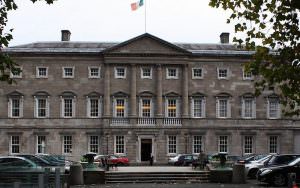Meet One of Ireland’s Forced Emigrants
Seamus Farrell is among the tens of thousands of young people from Ireland who came of age in the wake of the global financial crisis and left when they were unable to find work at home.

Seamus Farrell is a member of the Irish youth activist organization We’re Not Leaving. Photo by Hannah Goff
Seamus Farrell is among the tens of thousands of young people from Ireland who came of age in the wake of the global financial crisis and left when they were unable to find work at home.
The Irish Times on Saturday profiled Farrell and two other people between the ages of 15 and 24 who felt compelled to leave the country to have a shot at maintaining their quality of life. The article begins by citing Finance Minister Michael Noonan’s rubric for the Irish government’s latest budget: “a new road for a new Ireland.”
The paper says that “for young people listening,” Noonan’s assurance “offered little hope that that road would lead them anywhere but out of Ireland.”
Holding a psychology degree from a university outside Dublin, Farrell accepted a research position in Chicago when a six-month job hunt at home produced no results. The Times described the grinding facts of his search. “[H]e was competing against hundreds of applicants even for low-paid service-industry positions.” Upon returning home from his year abroad he joined the We’re Not Leaving organization. The group is dedicated to pressuring politicians into addressing the circumstances that are driving young people away and generally making life in the country difficult. The navigation bar on its website lists the issues as follows: “forced emigration,” “youth unemployment,” “precarious work & internships,” “grant cuts + fee hikes,” “mental health” and “housing.”
Farrell is a vocal member of the group. Responding to Noonan’s announcement, he told the Times: “The budget didn’t seem to help anyone who needed it. The headline changes were tax reductions for the highest income bracket, which has no impact on the low-paid, or small reductions to the USC which are cancelled out by water charges.”
“The overall reaction among young people was: this won’t help any of us. We wanted to see real initiatives to help with the cost of housing, and there was nothing. We hoped to see an increase in the dole for under-26s, which was cut to just €100 last year, but that didn’t happen either.”
And Farrell doesn’t buy Noonan’s cheery tone. “The positivity is localised in the media and in wealthy communities in Dublin. For everyone else, especially young people, work conditions are precarious: they are low paid or unemployed and thinking about emigrating.”
“Unemployment and emigration are still high, yet the cost of living is going up and up. Housing costs are massive; for young people trying to rent it is almost impossible to find a place in Dublin. Third-level registration fees have gone up again this year, to €3,000. Mental-health services and community supports, which are supposed to help people who are struggling, have been cut back and not replaced or reinstated. There are so many people out there who feel trapped.”
Of his decision to leave, Farrell explained: “I had to support myself and couldn’t afford to work for nothing, which seemed to be the only option. I didn’t really want to leave Ireland, but I didn’t feel I had a choice.”
Since his return from Chicago, he has volunteered as a youth worker in the Dublin suburb of Blanchardstown and worked as an English teacher in Donegal. Intent on finding a way to remain in Ireland, he recently began a master’s program at University College Dublin. But he knows what happens to many young people who return home feeling encouraged by the optimism of politicians.
“They are latching on to that hope they have read about. But sometimes they are only home for three or four months and they are gone again, because there’s nothing for them here. They realise how high the rents are and how hard it is to get around because of cuts to transport services. If they are lucky enough to find a job they are likely to be earning less, with poorer conditions. Why would they accept a diminished quality of life when they could be living in the likes of London with a reasonable standard of living?”
The Times’ profile ends with Farrell calling into doubt the intentions of Irish leaders who present their policies as beneficial to the country as a whole. “We are losing a generation of young people, who are so important for a country economically and socially. The question is, does the Government actually want young people to come back? It’s not evident from their policy.”
— Posted by Alexander Reed Kelly.
Independent journalism is under threat and overshadowed by heavily funded mainstream media.
You can help level the playing field. Become a member.
Your tax-deductible contribution keeps us digging beneath the headlines to give you thought-provoking, investigative reporting and analysis that unearths what's really happening- without compromise.
Give today to support our courageous, independent journalists.






You need to be a supporter to comment.
There are currently no responses to this article.
Be the first to respond.